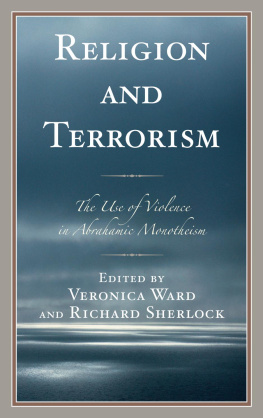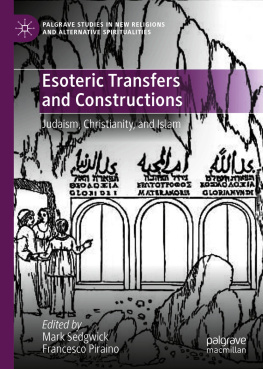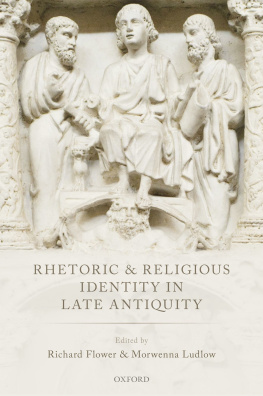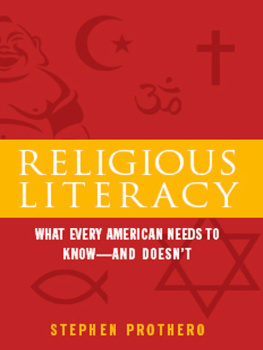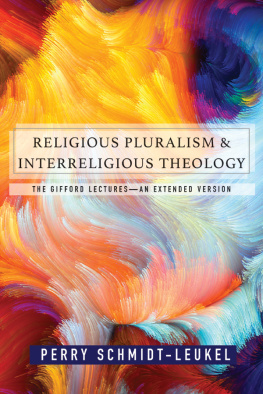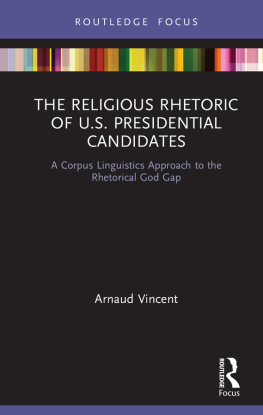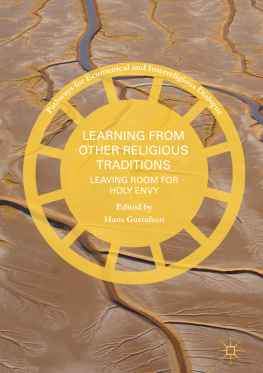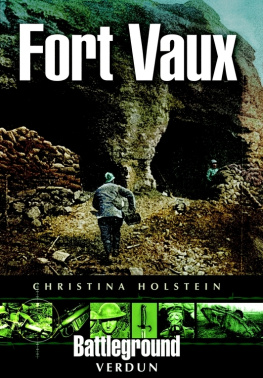Ethics and the Gulf War
Ethics and the Gulf War
Religion, Rhetoric, and Righteousness
Kenneth L. Vaux
First published 1992 by Westview Press, Inc.
Published 2018 by Routledge
52 Vanderbilt Avenue, New York, NY 10017
2 Park Square, Milton Park, Abingdon, Oxon OX14 4RN
Routledge is an imprint of the Taylor & Francis Group, an informa business
Copyright 1992 Taylor & Francis
All rights reserved. No part of this book may be reprinted or reproduced or utilised in any form or by any electronic, mechanical, or other means, now known or hereafter invented, including photocopying and recording, or in any information storage or retrieval system, without permission in writing from the publishers.
Notice:
Product or corporate names may be trademarks or registered trademarks, and are used only for identification and explanation without intent to infringe.
Library in Congress Cataloging-in-Publication Data
Vaux, Kenneth L., 1939
Ethics and the gulf war: religion, rhetoric, and righteousness /
by Kenneth L. Vaux.
p. cm.
Includes bibliographical references and index.
ISBN 0-8133-1459-3 (hc.) ISBN 0-8133-1460-7 (pbk.)
1. Persian Gulf War, 1991Moral and ethical aspects. 2. Just war
doctrine.
DS79.72.V37 1992
956.704'3dc20 91-44903
CIP
ISBN 13: 978-0-367-00280-0 (hbk)
The work of a moral philosopher takes on added verve when current events provide a moving backdrop for one's ethical reflections. The early months of 1991 and the war over Kuwait were such times of trouble, when issues of conscience were brought into sharp focus. Though Thornton Wilder's statement in The Skin of Our Teeth that "people are at their best in wartime" gives hollow justification for the risk and loss that war brings to so many people, conflict does force individuals and societies to declare their beliefs and values and take their stand for good or evil.
The winter and spring of 1991 were seasons of great moral wrestling and argumentation. For the benefit of the insight yielded by their passionate dialogue, I thank my fellow scholars in theology, history, and especially Judaic and Islamic studies at Oxford University. Regius Professors Oliver O Donovan and Rowan Williams framed the debate with boldness and courage and stimulated a lively and respectful dialogue, not only in the university but also in the broader church and society. Their consultation regarding my own emerging convictions is gratefully acknowledged. I also thank the librarians at the Theological Faculty on St. Giles and my fellow kibitzers in numerous tea pauses, especially Alan, Simon, Chris, and Ted. Lindsey Hossack was swift and splendid in preparing the typescript. I thank the three women in my life, the two Saras and Catherine, for keeping body and soul together. My wife, Sara, as always, brings to my books not only any baumherzigkeit they may possess but any literary grace as well. Thanks to Bert Vaux for his preparation and editing of the bibliography and camera-ready manuscript and to Michael Blechner for preparing the final copy. I thank the Ben and Genevieve Wagner Ethics Bequest for support in the preparation of this book and my American connection, Bonnie Wilkie, for indispensable research assistance. Fay Dickerson graciously agreed to prepare the index. For permission to quote from Wilfred Owen's war poetry and to quote the "Jihad" article from the Encyclopedia of Religion I thank New Directions and Macmillan publishers.
This book contains many references to words and actions that remain uncited due to the rapidly unfolding events of this war. Although referencing these remarks noted from radio, television, newspapers, and magazines would overburden the general reader with an excessive apparatus, it regrettably shortchanges the scholar.
As I make the final revisions to this book our medical school has learned of the tragic death of our head, Dr. Abdul Waheed Sajid. To his gracious spirit, his ecumenical vision, and his legacy of excellence, I dedicate this book.
Kenneth L. Vaux
- On August 2, 1990, Iraq invaded and proceeded to occupy Kuwait. Iraq later said it had been assured that the United States would not interfere in this "border dispute."
- Iraq ignored ultimatums that it abandon Kuwait by January 15, 1991, and February 23, 1991, provoking the Allied air and ground assault.
- U.S. President George Bush prayerfully consulted the just war tradition.
- Iraqi President Saddam Hussein, taking to his prayer rug, invoked the rhetoric of holy war.
- The following forty days of air war and one hundred hours of ground war was one of the most one-sided campaigns in history.
- With cease-fire initiatives floundering in the UN, Iraq ordered its troops to withdraw from Kuwait.
- The Allies bombed a massive convoy of Iraqi military and civilian vehicles retreating on the Kuwait City-Basra highway, killing thousands.
- The Allies sustained 200, the Iraqis 200,000, casualties.
- The war's aftermath continues to unfold, with the infrastructure of Iraqi cities in ruins and civilians suffering from shortages of food, drinking water, shelter, and even rudimentary medical care.
Awe is the spiritual background of both shame and hope. At the dawn of the last decade of this shamefully war-filled century and tumultuous millennium, the world has witnessed geopolitical conflict in a tiny kingdom on the shore of the Persian Gulf named Kuwait. In certain prelude to wars that will one day be launched from the stars, this war transpired in electronic and laser wizardry in the skies over Kuwait and Iraq. In bitter irony, the great post-Christian powers, which unleashed this technological apocalypse, and the Islamic nation, which precipitated that display and then suffered the outcome, alike focused their imagination and conscience on those long-silent metaphors of "just" and "holy" war. Could such construal betray a contrition that might presage hope? The war would ring with an apocalyptic dread and expectancy.
In the wings back stage stood nation-Israel. That simmering cauldron of secularist and fundamentalist people, that noble and beleaguered people whom Matthew Arnold held knew where the world was going, chafed at the bit to enter center-stage after the bitter humiliation of Iraqi Scud missile attacks, yet was mercifully constrained by a more enlightened self-interest, or a more uncanny faith.
In the chaotic aftermath of this terrible conflict, the world has grown old and young again. The frigid necessity and irrevocability of war, which no one wanted, again haunted a world that seemed to lie so close to a springtime of renewal and freedom. A year that began with the ecstatic sounds of Beethoven's Freude, Freude, Freiheit at Berlin's Brandenburg Gate on the Kurfurstendamstrasse ended with the fiery massacre on the road to Basra. Yet even as the dark clouds of smoke from burning oil wells paint an ominous El Greco skyscape over Kuwait, a teenage girl decorates her room in Kuwait City, an Iraqi lad returns to school, and a twenty-year-old American POW named Melissa begins her long journey home to friends and family.
War, like birth and death--topics I customarily address--is sacramental in significance. It exudes damnation and liberation. Scenes of sacrament occasionally interrupted the patriotic, propaganda-laden media coverage of the war: a U.S. soldier kneels beside an Iraqi prisoner of war and in kindly fellowship shows him how to open the rations package that looks to be his first meal in some time. Their communion, against a background of explosion and flame, recalls the eschatologica! feast during World War I when French and German troops came together on Christmas Day 1914 in the no-man's land between their lines to share food, drink, and song in koinonia (fellowship).


